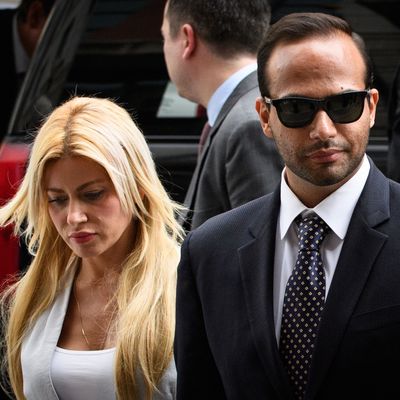
Before she and George Papadopoulos got married, Simona Mangiante Papadopoulos seemed to have high hopes for her fiancé’s cooperation with Special Counsel Robert Mueller. In December, she told ABC News that her soon-to-be spouse would be remembered as “the first domino” to fall in the Russia investigation — the first person associated with the Trump campaign to plead guilty to a crime arising out of Mueller’s investigation of the Kremlin’s interference with the 2016 election.
Expectations, including my own, were just as high for Papadopoulos. His guilty plea in federal court for lying to the FBI — made public on the same day Paul Manafort and Rick Gates were indicted for far more serious crimes — kicked off with great fanfare the public phase of Mueller’s sprawling inquiry, following months of speculation about what exactly the special counsel might have up his sleeve.
The public had good reason to be hopeful. What prosecutors filed in court that day was a bombshell in the truest sense. With stunning detail, Papadopoulos’s “statement of the offense” made plain that Trump’s onetime foreign-policy adviser had lied to investigators about “the extent, timing, and nature” of his contacts with an enigmatic professor that he “understood to have substantial connections to Russian government officials,” and who had volunteered that the Russians had “dirt” in the form of “thousands of emails” belonging to Hillary Clinton. At least on paper, Papadopoulos’s knowledge appeared to hold the key to a number of mysteries in the Russia investigation — including whether high-ranking Trump campaign officials unlawfully conspired with Moscow to tip the election.
But Mueller and his team knew better, and from the very beginning, they left us breadcrumbs signaling that Papadopoulos wasn’t all he was cracked up to be. In his same guilty plea, which he agreed to in secret several weeks before it became public in late October, something was missing: an explicit provision setting out a cooperation agreement with federal prosecutors. Or a promise that prosecutors would, in return, push for sentencing leniency if Papadopoulos were to provide “substantial assistance” to the government’s investigation — a common feature of cooperation agreements that was a part of the plea negotiations for other targets of the Mueller investigation, such as Gates and Michael Flynn, who to this day are actively cooperating.
Papadopoulos didn’t get any of those assurances, and if anything, there’s little in the public record indicating that Papadopoulos was of much help to Mueller at all. In a revealing sentencing memorandum filed in federal court last month, lawyers for the special counsel’s office offered a wealth of insights as to the timeline of the Papadopoulos case, and all the steps he took to make it harder for prosecutors to do their job. Most notably, Mueller’s team accuses the so-called coffee boy of hindering their capture of Joseph Mifsud, the elusive professor who had told Papadopoulos about the damaging Clinton emails the Russians had. “The defendant’s lies undermined investigators’ ability to challenge the Professor or potentially detain or arrest him while he was still in the United States,” the prosecutors conceded, all but acknowledging that Mifsud got away and hasn’t been found since.
Mueller’s office theorized that Papadopoulos’s rampant lies were motivated by self-interest and an attempt to secure a job in the Trump administration. One week into the new administration and just hours after his first interview with the FBI, for example, investigators discovered that he had sent his bio and a description of his campaign work to the Energy Department (he was a self-described energy consultant before he joined Trump’s foreign-policy team). Ultimately, after repeated attempts at getting him to be truthful, prosecutors concluded that Papadopoulos undermined his own case and wasn’t of much help. “The defendant did not provide substantial assistance,” they wrote in their sentencing recommendation, “and much of the information provided by the defendant came only after the government confronted him with his own emails, text messages, internet search history, and other information it had obtained via search warrants and subpoenas well after the defendant’s FBI interview as the government continued its investigation.”
It certainly didn’t help that Mangiante Papadopoulos, his wife, started railing against the Mueller investigation in media interviews and on Twitter as he awaited sentencing — going as far as to suggest that the special counsel wasn’t giving her husband enough credit for cooperating, that he may need new lawyers, and that Trump should consider pardoning him. Just last month, she told the Daily Caller, a conservative news site, that her husband should consider tearing up his plea deal. Mueller’s office appears to have had it with the publicity tour: In court papers, lawyers for the special counsel refuted point by point several of Mangiante Papadopoulos’s claims in the court of public opinion, and on one occasion they abruptly canceled a prearranged meeting with Papadopoulos himself once prosecutors learned “that the defendant had participated in a media interview with a national publication concerning his case.” A little-noticed protective order agreed to by Papadopoulos’s lawyers ahead of sentencing — and signed by the judge — is a strong indicator that lawyers on both sides of the case didn’t want anyone directly or tangentially associated with it to leak details about the investigation or what exactly Papadopoulos relayed to investigators.
Which brings us to Papadopoulos’s day of reckoning last Friday. U.S. District Judge Randy Moss sentenced him to 14 days in federal detention, one year of supervised release, 200 hours of community service, and a $9,500 fine. That may sound like a walk in the park, but it won’t be: Federal probation is no fun, and the felony conviction will follow Papadopoulos the rest of his life. In arguing for a light sentence, his lawyer, Thomas Breen, told the judge that Trump did more to put obstacles in Mueller’s path than his client did. “The president of the United States hindered this investigation more than George Papadopoulos ever could,” he said in open court, according to Politico. At no point did Breen suggest that Mueller’s office behaved improperly or engaged in misconduct in the course of the prosecution, a common complaint of Trump’s allies.
So concludes the anticlimactic saga of the first domino of the Mueller probe, which continues apace later this month with the second trial, this time in Washington, of Paul Manafort, as well as the ongoing grand-jury investigation of Roger Stone, which has seen strange twists and turns. In an interview with George Stephanopoulos on Sunday, one of several he has given in recent days, Papadopoulos said that following the completion of his sentence he intends to write a book and head to Hollywood — presumably to turn his life into a movie. Those who paid close attention to his words may have noticed something funny: He praised Trump and distanced himself from his lawyers’ “opinions” about him, including the notion that he’s an obstructor-in-chief. “I wish him all the luck in the world and I hope he continues to do good things for this country,” Papadopoulos said, as if deep down he really wishes he had never been responsible for lighting the spark of a counterintelligence investigation that has haunted the Trump presidency and maybe even the course of American history.





























